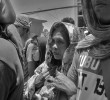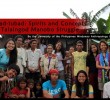By the Policy Study, Publication and Advocacy (PSPA)
Center for People Empowerment in Governance (CenPEG)
The voters’ turnout in the May 14 mid-term elections could be the lowest in six years and this can be attributed largely to widespread disenfranchisement of voters throughout the country.
Yesterday, Comelec Chair Benjamin Abalos, Sr. estimated the turnout at 75 percent nationwide but other reports showed a 65 percent turnout, a drop compared to previous polls. Several precincts in the National Capital Region have reported as low as 50 percent to 60 percent turnout.
If this is the case, yesterday’s elections could be the lowest in years, with 77 percent turnout in 2004 and 85 percent in 2001, the Center for People Empowerment in Governance (CenPEG), an independent political study group, found today in its first issue of “Election Forensics 2007.”
Reports of partial monitoring and documentation of yesterday’s elections showed that possibly hundreds of thousands of voters were directly disenfranchised with the names of many legitimate voters missing in master lists or names found in other precincts. There were also complaints of missing precincts, many master lists unreadable, delayed opening of polling precincts, and of voting marked by long queues thus preventing many voters from casting their ballots.
Other voters experienced harassments not only from supporters of candidates but also from military and police personnel. There were reports of voters being forced to vote for certain party-list groups supported by the government.
This is the initial assessment made by CenPEG’s Policy Study, Publication and Advocacy (PSPA) program based on reports it received from various independent poll watch groups and news monitoring.
Among others, the reports came from the nationwide Task Force Poll Watch (TFPW) of Party-list groups, the Parish Pastoral Council for Responsible Voting (PPCRV), Kontra Daya, monitoring by UP mass communication student volunteers, foreign observers missions as well as partial field reports from 30 provinces.
In Baguio City, Quezon City, Manila, Caloocan, Bulacan, Nueva Ecija and other areas, many voters complained about their names missing in master lists while groups of voters were harassed and prevented from going to their precincts. Election-related tension and violence in many provinces particularly in Mindanao discouraged many voters from going to the polls, other reports said.
On the other hand, many of 39 electoral fraud incidents reported partially by the PPCRV involved disenfranchisement.
While accounts about military interference on the scale that took place in 2004 have yet to be received, there were reported incidents of military and police forces involved in voters disenfranchisement on election day. In at least two barangays in Guimba, Nueva Ecija many voters were told by government soldiers not to vote for Bayan Muna, Anakpawis and Gabriela and to vote instead for Bantay party. Bantay, said to be a creation of Malaca�ang, has former Brig. Gen. Jovito Palparan, named by both state investigators and foreign groups as accountable for several cases of extra-judicial killings, as its first nominee. Similar incidents were also reported in Baguio, Batangas, Cavite, Laguna, Leyte, Albay, Sorsogon, the two Camarines provinces, Eastern Samar and several provinces in Mindanao.
Spokespersons of the groups fear that with results of voting in the Party-list election remaining unaccounted for in quick counts 24 hours after counting had begun, they could be vulnerable to cheating particularly by pro-government operators.
At this early, the cluster of voters who were unable to vote in the mid-elections are the overseas absentee voters (OACs), with only 20 percent or 71,668 of about 504,110 registered overseas voters able to exercise their right to vote.
With recent surveys showing 70 percent of Filipinos predicting the occurrence of massive fraud in the mid-term elections, there is a high probability of an increasing number of the electorate staying away from the polls. This pessimism and other factors would explain the possible low turnout in yesterday’s polls.
CenPEG is a public policy center set up shortly before the May 2004 elections to help promote people empowerment in governance and democratic representation of the marginalized poor in an elitist and patronage-driven electoral and political system. It conducts research/policy study, education and trainings on governance and people empowerment. To pursue its programs in research and education-training, CenPEG taps a wide pool of political analysts, public policy experts and academic scholars for their expertise and experience in public governance as well as in grassroots empowerment. (davaotoday.com)
2007 Elections
![[STANDPOINT] Illegal drugs and the NIMBY mindset](https://davaotoday.com/wp-content/uploads/2016/09/Mags-Maglana_UPMIN-Sept.-20-110x100.jpg)








